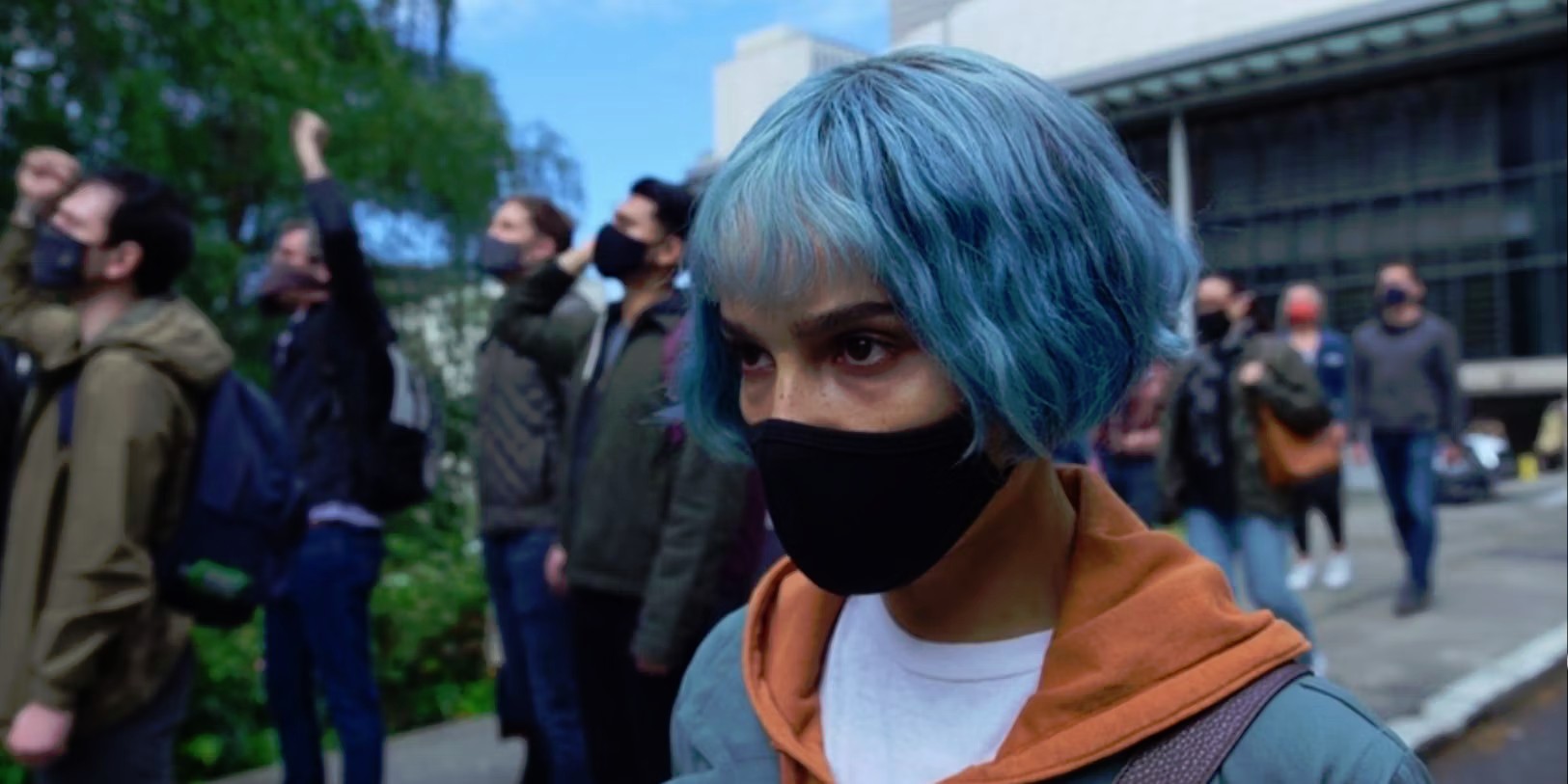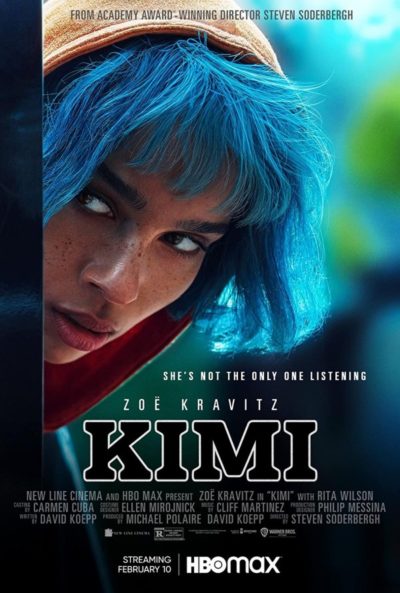 ★★★
★★★
“Blue is the warmest colour”
Angela Childs (Kravitz) is a computer programmer who fixes bugs on the new smart speaker “Kimi”. It’s a perfect job, as she suffers from agoraphobia but can work at home, interrupted only by occasional sex with friendly neighbour (Bowers). When she finds a recording she thinks is a sexual assault on a woman, she contacts her superiors, who don’t seem eager to contact the FBI. Angela experienced an assault in the past herself (causing her agoraphobia), and goes directly to an executive at the central office, Natalie Chowdhury (Wilson). What she does not know is, that her company is about to go public and the woman she heard, the lover of its CEO, is already dead. Not only are the authorities uninformed, her own company has sent hired killers on her trail, with state-of-the-art tech to locate Angela. She must leave her home, agoraphobia or not.
This movie got my initial attention when I saw the poster with a blue-haired Zoë Kravitz and the word “Kimi” over it – I originally thought that would be the name of her character. I don’t know if this movie was actually shown in cinema in the US (Jim: no, it went straight to streaming), here in Germany it ran in a few cinemas for about 2 weeks. In America it can be seen on HBO Max; here in Germany it is available on Amazon-Prime. This is good as there is – unlike the US – no German DVD release. I worried this would be another one of those “woke” movies: it’s not. Written by first-class screenwriter David Koepp (Jurassic Park, Mission Impossible“, Spider-Man (2002), Indiana Jones 4) and directed by Steven Soderbergh, this movie proves to be very effective.
We see Kravitz living quite comfortably in her large flat and though she can only see her mother online and isn’t able to go downstairs to meet her friend for some fast-food in front of the door, she isn’t missing much. She more or less has everything she needs at home. In that respect the movie perfectly mirrors the situation many of us around the globe experienced during the lockdowns, when we were asked to work from home if we could. Let’s face it, quite a lot of people got used to this kind of situation, and companies could save a lot of money, not needing to have their employees actually in a dedicated working place.
 Kimi indirectly discusses this attitude, but also seems to make a clear point that there is a need to leave your own four walls sometimes, because not everything can be handled from your laptop. That said, it’s quite disturbing how much can be done by digital tracking, and this results in a real “woman hunt” through the city, with Angela’s chances rising when she gets rid of her mobile phone. The world outside is frightening through her eyes: some people are out but it’s not too crowded until she gets into a demonstration. Most shocking is the way she is almost kidnapped there by the assassins, in broad daylight. I’d also like to mention the unusual but good and very interesting score by Cliff Martinez, such as when she escapes from the central office.
Kimi indirectly discusses this attitude, but also seems to make a clear point that there is a need to leave your own four walls sometimes, because not everything can be handled from your laptop. That said, it’s quite disturbing how much can be done by digital tracking, and this results in a real “woman hunt” through the city, with Angela’s chances rising when she gets rid of her mobile phone. The world outside is frightening through her eyes: some people are out but it’s not too crowded until she gets into a demonstration. Most shocking is the way she is almost kidnapped there by the assassins, in broad daylight. I’d also like to mention the unusual but good and very interesting score by Cliff Martinez, such as when she escapes from the central office.
It is not until about an hour that Kravitz leaves her apartment. But ultimately her journey leads back home: in the end no one can help, not even a friendly stalker from across the street – only herself. The movie has been from time to time mentioned in comparison with Hitchcock’s Rear Window which I think is a bit too high praise. Other movies such as Blow Out (1981) by Brian de Palma, Enemy of the State (1998) with Will Smith and Gene Hackman, or the recent Netflix thriller The Woman in the Window (2021) with Amy Adams come to mind. The last one especially shares the basic situation of the protagonist with this, though Window is much less successful. Kimi is also part of a long line of what could be called “digital surveillance thrillers”.
David Koepp himself once wrote a similar movie: Panic Room (2002) in which Jodie Foster had to defend herself and her daughter from that location against burglars. But while in Panic Room the main idea was to escape and get help, here there is no more security outside. The authorities can’t (or don’t want to) help, and your employer or company have turned against you. It’s a subject Soderbergh has previously covered in Haywire or Unsane. So, while Koepp and Soderbergh don’t tell an entirely new story here, they have put it on a contemporary level. This works, giving a new coat of paint to the old thriller genre, that has become a bit stale and isn’t seen so often anymore. Modern Hollywood seems more interested in the newest superhero movie or the latest Tom Cruise blockbuster.
Kravitz gives in my opinion a very good performance. I’ve never been a real fan, though she seems to have had a breakthrough as Catwoman in The Batman (2022), opposite Robert Pattinson. Here, I can’t complain: I was convinced the heroine was both agoraphobic and quite stubborn. The other actors here are largely unknown, yet give good, fitting performances, and it all comes together well. There are some nice audio ideas in the movie; for example when Angela puts on her headphones everything becomes quiet. This is the same thing we do on a daily basis: just try to fade out the real world. Kimi seems to be saying that we maybe shouldn’t do this so often. We should go out and involve ourselves, and take a stand for things we care for. That’s not a bad message, I think.
Dir: Stephen Soderbergh
Star: Zoë Kravitz, Byron Bowers, Rita Wilson, Erika Christensen




